It’s not really St.John, you know.
No one really had that as a last name. It wasn’t a medieval occupation like Smith, or Baker, or Fletcher, or Cooper. An eccentric master at school would always ask if it was Sinjin, since I went to Upper Canada and it must have been the English pronunciation, mustn’t it? “No sir, we were from Ireland,” I would say, and that was complicated enough to end the conversation.
We weren’t from Ireland either, it turns out. We were from the German Palatinate, about 300 years ago. I know this because Russell St. John did the research on this. It probably went from Sohngen to Singeon to St.John because it was easier to pronounce after the family moved to Limerick. By the time they got to Ontario, it was St. John anyway. By trade, they were vinedressers. Amazingly, the Sohngens who went directly to America and didn’t go through a surname shift mostly became maltsters.
This tickles me as I stand in the sunshine, surveying the hop bines on the ground. Today I am a vinedresser, too.
The Centennial hops on Mom’s property in Kingston have been growing all summer. Some other year, I will go and watch them train up the trellis and coir, straining sunward at midday in their ascent. This year, it has been hard to find time, but it becomes obvious that for a good vinedresser, time is something to be made.
You cannot learn physical skills by reading books. Even Stan Hieronymous’s excellent book on hops does not really tell you how you are to harvest them: 15 bines that do not quite express their full height and cluster together decoratively but not optimally for growth. 15 bines that now in the late summer take on the allium tinge of garlic where they have been sunburnt. 15 bines that I am a week late for.
It is not something that I have done before. I have seen hops, and talked of hops, and taught of hops, and surely have consumed my share, but this is not that. This is choring.
There’s little pre-emptive discussion about how to handle the harvest. There’s talk of nitrile gloves because Stan has written that a lot of this process is feel. I have mistaken tactile sense for the larger sensory apparatus in that connection. When I arrive the coir has been cut by Bob from next door and the bines lay on the ground like fragrant ship’s rope.
Some cones have gone pale yellow in the sunlight, their bracts open to the air and the resin oxidizing the whole time and those are unusable and for a moment at least it looks like maybe the entire crop is a failure. I have the brief thought that it would be a lot less work if that is to be the case, but that is not what a vinedresser does. The job is to bring forth the potentiality of the vine. To train and coddle and orient and prune and eventually realize value; not even for one season, but to cull the fruits of labour in perpetuity. To take care. To discount the potential would be a monstrous abdication of responsibility.
“Where’s the bucket?” I say.
The first day, I use the nitrile gloves, and I attempt to sit in a chair. I am dissuaded from this by a spider the diameter of a side plate climbing my leg from out of some shaded leaf on the bine. After a series of expletives, I adopt a standing posture, albeit involuntarily. I have chosen a space near the garage, which means dragging the bines from the yard.
I am colorblind; red-green, blue-purple. A real detriment in hop picking, but Stan says, via twitter, that it isn’t how they look but how they smell. It is true. The tells are there. You’re looking for heavy cones, slightly moist and at least as long as my thumb is wide. The brown spots are not downy or powdery mildew, but rather sunburn. The western exposure of the trellis has resulted in the western wall of bines developing the odd brown leaf within a cone. As time passes I realize we are sometimes forced to discount half a plant due to the orientation of the yard and the western exposure. The cones are not reaching their full potential as they are only in their second year. The surest sign they are played out is the rustling sound as you lift the bine from the macadam. The tells are aural and visual and tactile and aromatic. Everything is information.
Underneath, there are viable cones. You must be thorough. You must turn over the bine and the leaves and harvest those viable ones that resist gently between the thumb and forefinger when squeezed. The plant is there and you must harness the potentiality of it. There are ladybugs and caterpillars hiding and I place them on the ground with a small apology. I do not like to hurt anything if I do not have to.
The first day, it is choring and it seems like choring, and not even Marty Stuart and His Fabulous Superlatives on Spotify will make it seem like anything else. 15 bines is probably too many for home consumption. We have made a dent, and I say to Mom when she says we’re done picking hops, “there’s another bucket out there.”
And it would be easy, since we have no beer to make with these hops, to leave it at that. But the abdication of potentiality bothers me and some meaning like ‘duty’ flashes in some deep recess in my brain because these could be something to someone and they spent a summer watching them grow and to let them lie there is no fair play and no good to anyone.
And after breakfast, the cones on the bines on the ground have tightened slightly for the morning dew, and in the sunlight the warmth,and instead of the macadam, I take the bucket to them, and leave off the nitrile gloves, and with the shears tucked into my back pocket I have just enough knowledge of what I am looking for; To be able to discount entire sections into the compost bag and discover the tight green cones beneath with their douglas fir and christmas tangerine aroma. The cones that have not faced the sun are doing better and hours later with weals on my forearms, bit by the fibrous leaves and bines and resin, there is sure enough another bucket.
It might come to ten ounces dried, but in the end there is not much else to life. You must dispose of the parts that do you no good, improve what you can, and make plans to better your next attempt. Love and duty, attention paid and care taken and the faith that that will be enough.
Next year I’ll go earlier, some day in late June to see how they train and some day in late August and get them down earlier, the ones on the outside, and we’ll use fewer composting bags. The year after that we’ll have longer, fuller cones and maybe we’ll make a beer with the wonderful yellow flowers.
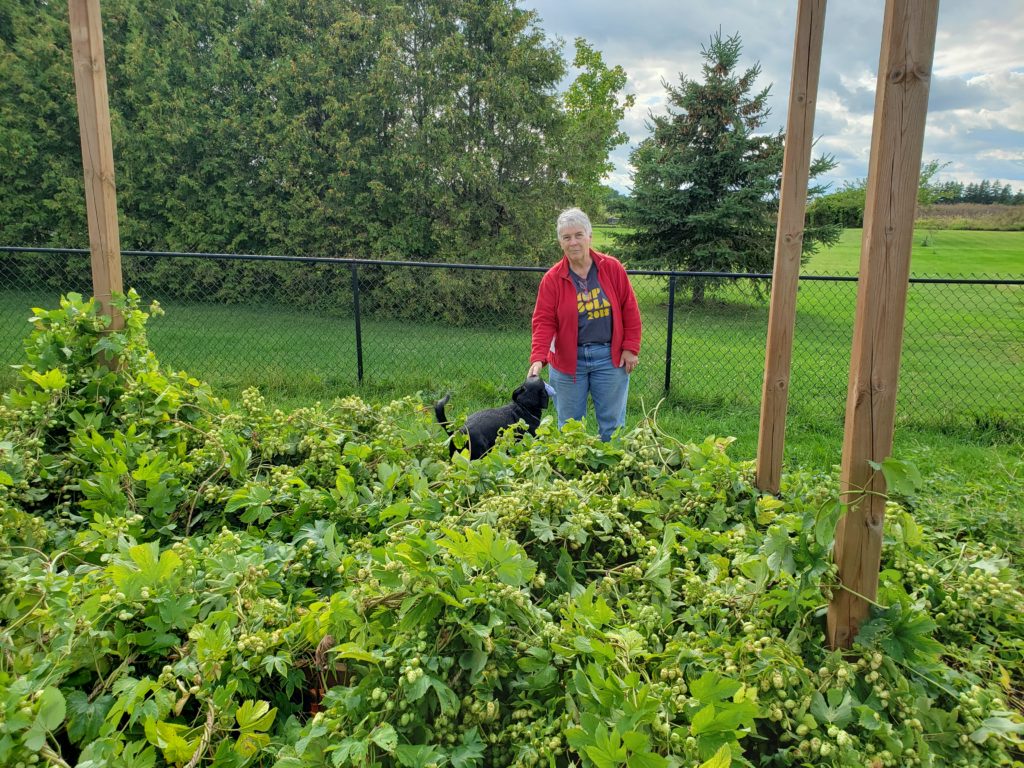
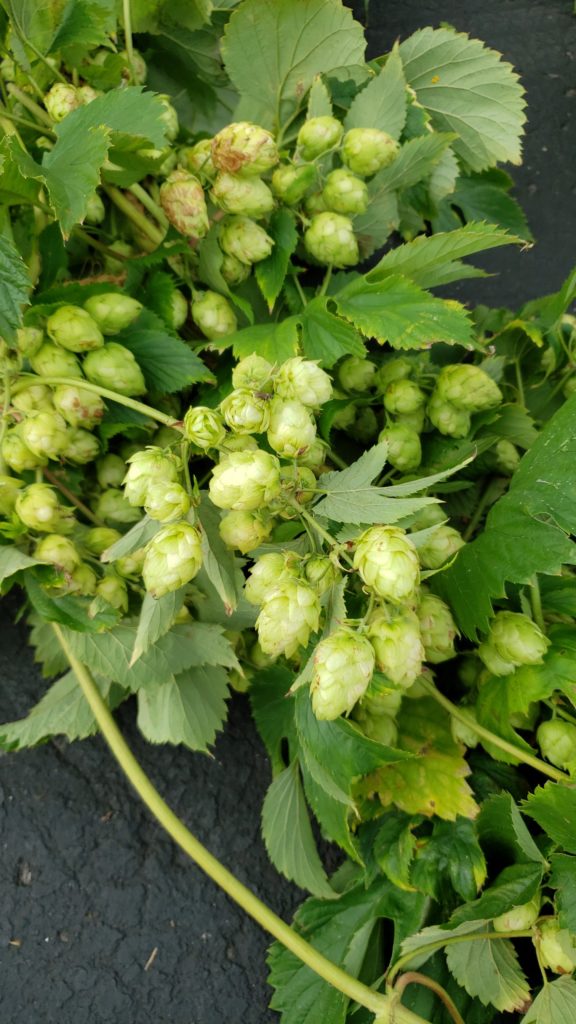
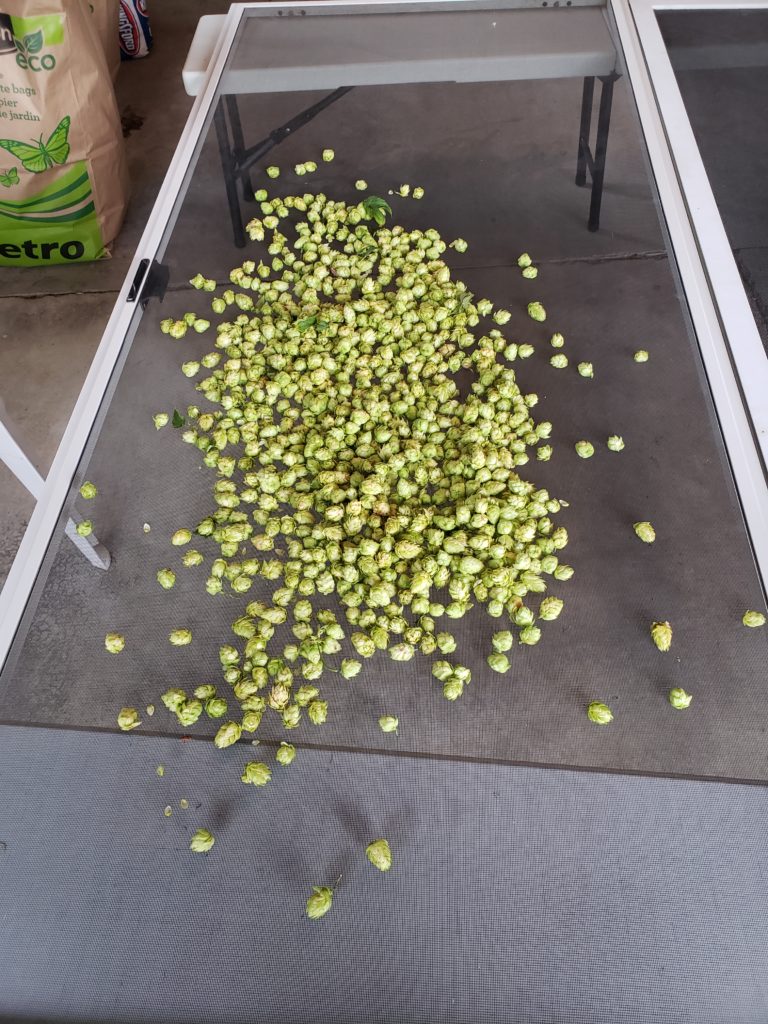
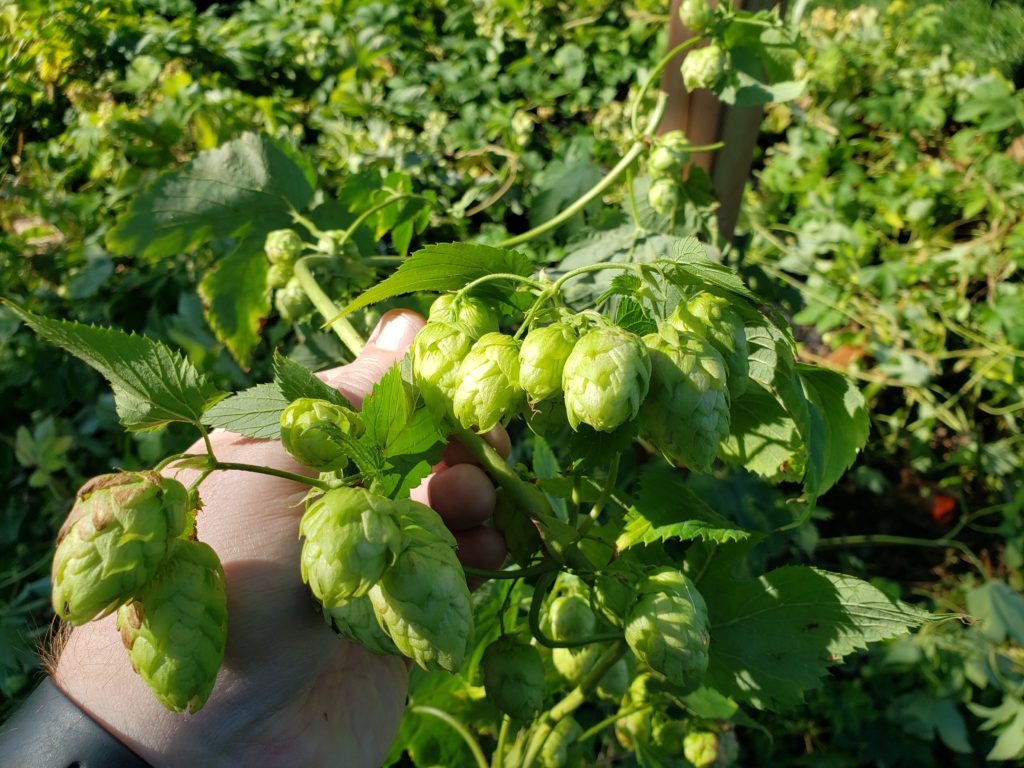
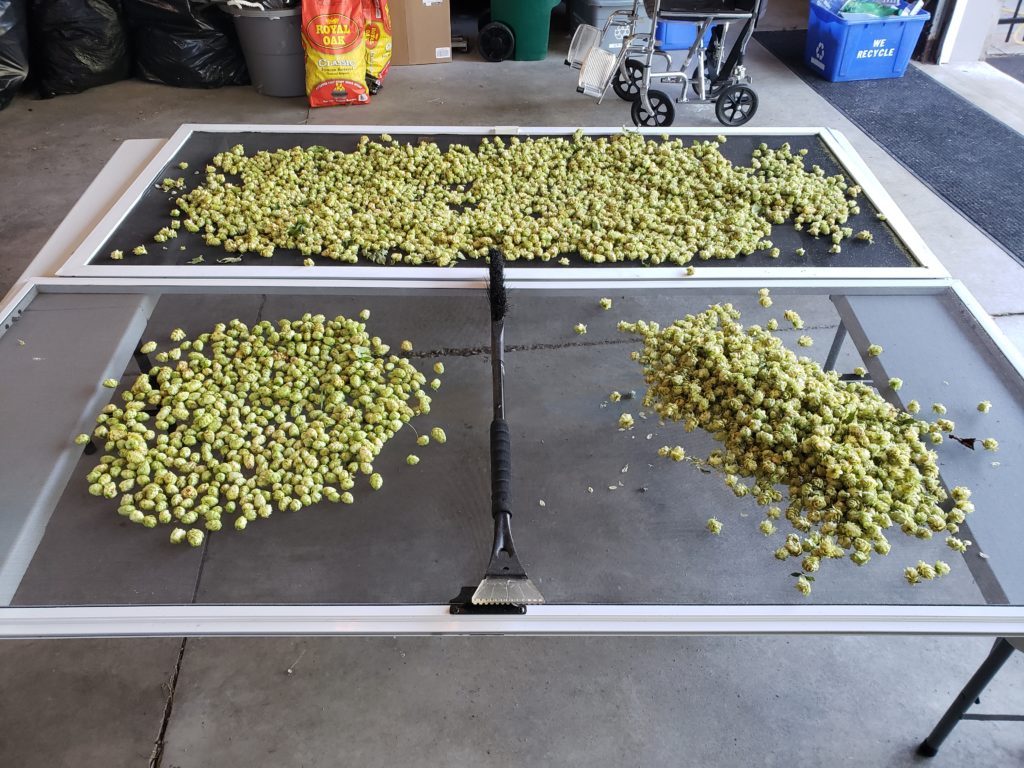
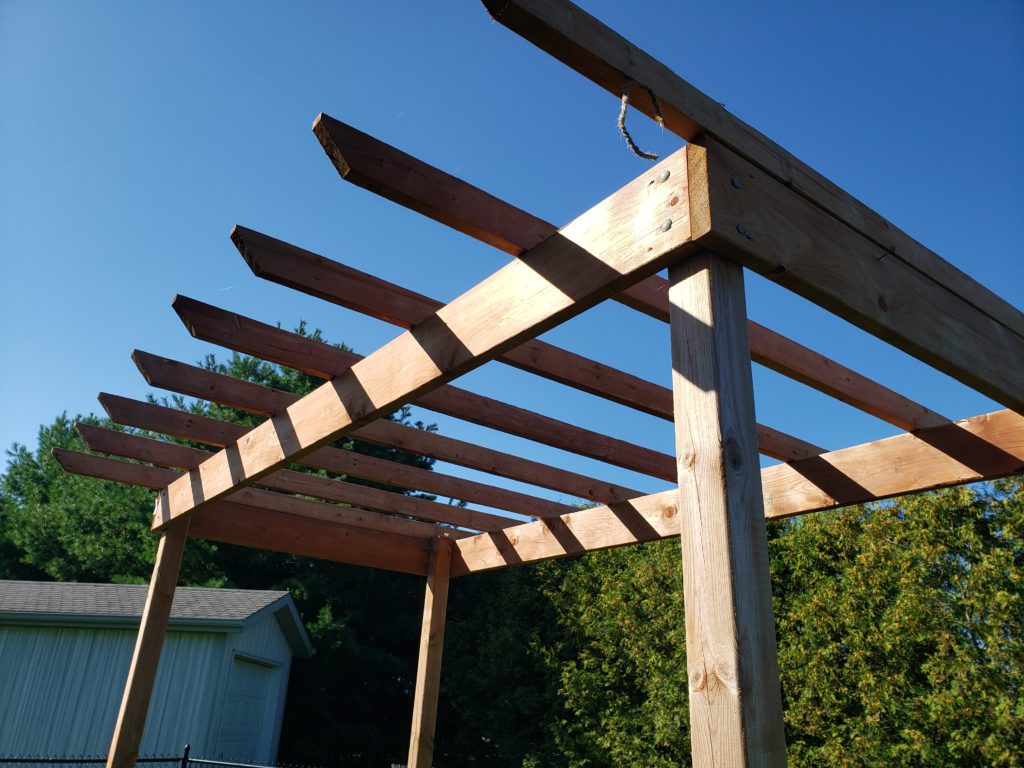
Pingback: The Week We All Decided Good Beer Is Anti-Fascist Edition Of The Thursday Beer News – Read Beer
Aside from composting is there any practical use for the nonviable cones?
Not a huge amount. People use them as potpourri or decoration. Sometimes you will see people use hop pillows as they are theoretically a soporific.